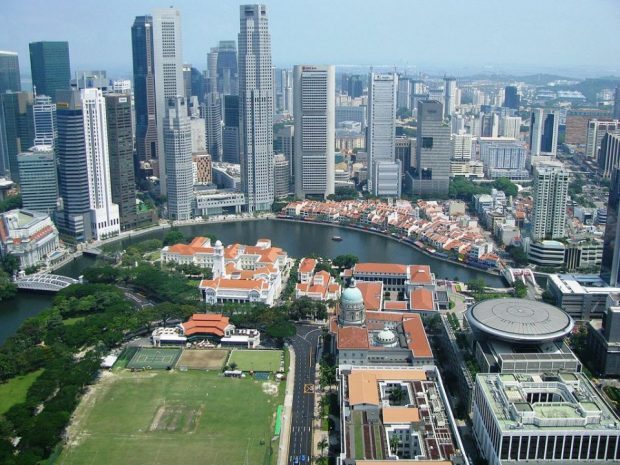
Singapore may defer polls to fight wily Wuhan bug’s death dance

By Ivan Lim
Former AJA President Contributor to AsiaN
Singapore: Nothing does better than a little humour to break the glum atmosphere created by the fearful Coronavirus outbreak.
Like this anonymous post on social media: “I have been studying the virus just like every one of you and come to these conclusions. It is highly intelligent…attends conference in Hyatt (hotel). It knows how to enjoy life…stays in Sentosa and cruises for holiday. It is deeply religious…attends churches. But also gambles at MBS (Marina Bay Sands resort and casino).”
As medical advice goes, the new deadly disease is contagious en masse. The Grand Hyatt business conference held on Jan. 20-22 was attended by over 240 participants, including a Chinese national from Wuhan city, the birthplace of the pneumonia bug. The virus is believed to have passed on from him to Singaporean, Malaysian, two South Korean and British participants.
The virus also found its way to the resort-island Sentosa in January where many Chinese tourists were holidaying. Two Chinese men from Wuhan who stayed at Sentosa resort/spa and at Village Hotel Sentosa had tested positive for the virus. A Chinese woman contaminated by the virus had visited the MBS resort/casino.
The Covid-19 also made its presence in two churches – the Life Church and Missions Singapore and the Grace Assembly of God– where Chinese visitors from Wuhan had attended services together with Singaporeans. Both churches were deemed as “clusters” of contamination.
Travelling across the seas, the virus caught 3,700 holidaymakers on board the Diamond Princess cruise ship unawares. A passenger who left ship in Hong Kong was the first to come down with the Covid-19 on Feb. 2. By the time the vessel docked at the Japanese port of Yokohama, more cases of the infectious disease were uncovered. There were 643 cases of infection and two deaths.
Politics-wise, the threat posed by the virus in Singapore has prompted the authorities to rethink about the timing of the general election (GE).
The ruling People’s Action Party (PAP) appeared primed to call polls soon after the parliamentary debates on the Budget unveiled on Feb. 18 that was packed with goodies. Covid-19’s unforeseen has turned attention of all political parties to focus on fighting the epidemic.
Capitalising on the element of surprise, the PAP led by Prime Minister Lee Hsien Loong has thus far kept mum on the general election. Constitutionally, it has until April 2021 to hold the GE. Its party strategists are counting on the success of government measures to contain the virus to win the popular vote of confidence.
Instead, it was the opposition Progress Singapore Party (PSP) which cautioned about the virus impact on holding elections marked by open-air public rallies attended by thousands of supporters.
“The illness can stretch on. I think it is not wise to hold the election so fast,’’ said PSP general secretary, Dr Tan Cheng Bock, a medical practitioner. “[What] with all these campaigns, we have to be careful long-term.”
Will the virus-induced delay in the general election give the advantage to the ruling party or to the opposition?
For better or worse, the politicians on both sides would have the last laugh as the GE signal the coronavirus’ end.
For background: With its close social and economic links to China, Singapore is one of the first countries in the region to feel the contagion of the new virus.
To date, the city-state of 5.83 million people has 110 cases, with 24 in stable condition or improving while six remain critical. So far, 78 patients have been discharged.
Within days of the news of the Wuhan virus outbreak on Dec. 31, the government swung into action. The Ministry of Health (MOH) acted to screen and isolate potential carriers of the virus from China. Thermal scanners were set up at Changi Airport to check arriving passengers for fever, an early symptom of the pneumonia.
The government stepped up its efforts by establishing a multi-disciplinary taskforce to handle the aggravating threat after the Chinese authorities disclosed the swift spread of the mystery bug, citing a leap in the number of cases.
Key ministers held press conferences to address the evolving epidemic and assure citizens that the government is taking every measure in its toolkit to tackle the most serious epidemic since the 2002-2003 Severe Acute Respiratory Syndrome (SARS) phenomenon.
In response to a public rush for protective masks, leading to retail shortages and price hikes, the government mounted a distribution exercise to provide for free a set of four masks to 1.5 million resident households at community centres. That went off smoothly.
Through press briefings, the taskforce also kept the nation abreast of the government measures in response to unfolding developments such as sending planes to evacuate Singaporeans stranded in Wuhan following the city’s lockdown.
With the instance of human-to-human transmission of the virus, the government took further measures such as requiring people returning from Wuhan in Hubei and other affected Chinese cities to take 14-day Leave of Absence from work or study, and quarantine for those who showed symptoms of the illness.
On Feb. 7, MOH confirmed three new cases not linked to existing patients nor travel in China and raised the. level of alert from yellow to orange – a higher state of alert that has been maintained till now.
Only when local transmissions get out of control will a red code be imposed.


